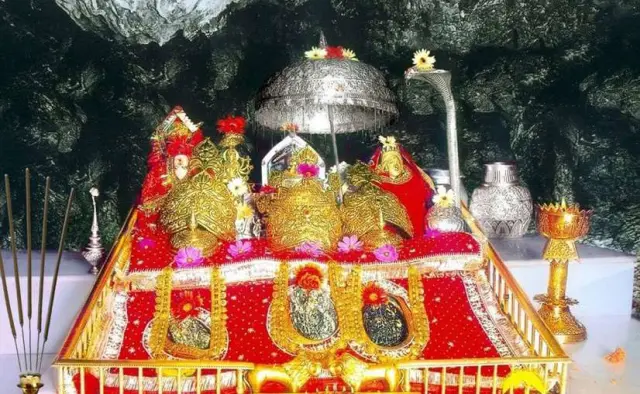Mata Vaishno Devi
Introduction
Vaishno Devi, also known as Mata Vaishno Devi, is a revered Hindu goddess worshipped predominantly in the northern regions of India. She is considered a manifestation of the Hindu Goddess Mahalakshmi, Mahakali, and Mahasaraswati. The pilgrimage to the shrine of Vaishno Devi, located in the Trikuta Mountains of the Indian state of Jammu and Kashmir, is one of the most sacred and popular pilgrimages in India
The legend of Vaishno Devi traces back to ancient Hindu mythology. According to the legend, Vaishno Devi was born as a divine incarnation to rid the world of evil forces. She took birth as a young girl named Vaishnavi and underwent rigorous penance and meditation to attain spiritual powers.
It is believed that Vaishno Devi resided in the remote caves of the Trikuta Mountains, where she dedicated herself to meditation and austerity. She is revered as the "Mother" who fulfills the wishes of her devotees and protects them from harm.
The pilgrimage to the Vaishno Devi shrine involves a trek of approximately 13 kilometers from the base camp at Katra to the Bhawan, which is the holy cave shrine where Mata Vaishno Devi is believed to reside. The journey is undertaken by millions of devotees annually, especially during the auspicious period of Navaratri, to seek the blessings of the goddess.
The shrine complex at Vaishno Devi includes various temples and facilities for pilgrims, including accommodations, eateries, and medical facilities. The pilgrimage is not only a physical journey but also a deeply spiritual experience for devotees seeking the divine blessings of Mata Vaishno Devi.
Devotees believe that Mata Vaishno Devi's blessings bring protection, prosperity, and fulfillment of desires. The reverence and devotion towards Vaishno Devi continue to be an integral part of the cultural and religious fabric of India, attracting pilgrims from all walks of life to seek the blessings of the divine mother.



